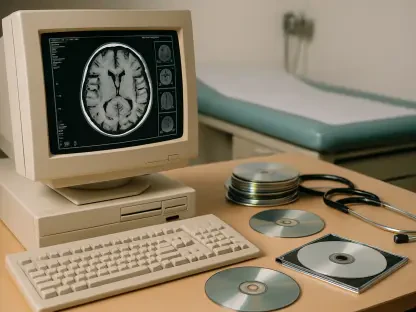The landscape of healthcare has been profoundly reshaped in recent years, with Medicare Advantage (MA) plans at the forefront of this transformation. As more than half of all Medicare beneficiaries have embraced these plans, technology has become a pivotal force in redefining the operations, strategies, and expectations of healthcare providers. This evolution is not merely about the adoption of gadgets and systems but about creating a healthcare environment where data-driven decision-making, efficiency, and patient-centric care take center stage. The integration of technology within Medicare Advantage frameworks signifies a shift from traditional, volume-driven models to value-based care, compelling providers to adapt rapidly to stay competitive.
The Intersection of Technology and Healthcare in MA Plans
Bridging the Gap: Technology as a Cornerstone for MA Plans
Medicare Advantage plans are increasingly relying on technology to bridge the gap between traditional care and modern expectations. The integration of tech solutions is crucial for achieving efficiencies in care delivery, maintaining compliance, and enhancing patient outcomes. This transition towards technology is driven by the need for comprehensive data analytics and streamlined operations, facilitating a move from volume-based services to those focused on achieving measurable health improvements. As such, technology enables providers to meet the demands of MA plans by managing extensive patient data, enhancing communication channels, and adopting innovative care strategies that emphasize value and results.
Value-Based Care: Technology’s Transformational Role
The shift from volume-driven to value-based care models within Medicare Advantage frameworks underscores the transformational role of technology. The emphasis on outcomes that enhance patient health while mitigating excessive hospital visits demands a systematic approach to care. This involves leveraging technology solutions like remote patient monitoring and telehealth services, which allow for proactive health management. These tools significantly contribute to real-time tracking of patients’ health statuses, early detection of potential medical issues, and reduction in hospital readmissions, all of which align with MA plans’ objectives of reducing overall healthcare costs and improving care quality.
Data as a Strategic Asset in Healthcare Transformation
The Power of Data in Shaping Healthcare Delivery
The role of data in healthcare strategy has never been more pronounced, especially within Medicare Advantage plans. Providers are compelled to harness data not just for meeting documentation mandates but as a tool for measuring performance and enhancing care delivery. Clean, timely, and structured data forms the backbone of effective care management, influencing decisions from clinical evaluations to operational adjustments. The capacity to present verifiable data demonstrating outcomes such as reduced hospitalization rates or improved patient adherence enables providers to better negotiate contracts, secure referrals, and tap into new service segments, thereby reinforcing their competitive standing.
Enhancing Decision-Making Through Data Analytics
Data analytics offers a powerful avenue for informed decision-making in Medicare Advantage. By employing analytical tools, providers can derive insights that drive better patient outcomes and refine operational strategies. These insights facilitate the identification of care gaps, optimization of resource allocation, and enhancement of service delivery processes. As a result, providers are equipped to cater to specific needs within the Medicare Advantage ecosystem, fostering a culture of accountability and continuous improvement. Thus, data analytics not only supports compliance and performance evaluations but serves as a catalyst for innovation and growth within the healthcare sector.
Challenges and Opportunities for Providers
Overcoming Technological Barriers
While technology presents myriad opportunities, it also poses significant challenges, particularly for smaller healthcare providers. The financial burden of implementing large-scale IT solutions and training staff to navigate new systems can be daunting. These challenges necessitate innovative solutions, such as the adoption of modular, cloud-based platforms that allow for incremental upgrades and lower initial investments. Moreover, robust training and support systems are essential to maximize the benefits of new technologies, ensuring staff competence and confidence in utilizing these tools effectively.
Importance of Interoperability in Technology Solutions
Interoperability remains a critical consideration as providers integrate new technologies within their operations. Many healthcare systems struggle with legacy platforms that fail to communicate effectively with modern technology or payer systems. Evaluating new tech solutions through the lens of interoperability is crucial, with preference given to vendors supporting industry standards such as HL7 and FHIR. Ensuring seamless interaction between systems enhances efficiency, reduces administrative burdens, and fosters a more cohesive healthcare delivery process. This capability is essential for maintaining alignment with Medicare Advantage requirements and optimizing care coordination.
Strategic Considerations for Healthcare Leadership
Leadership’s Role in Facilitating Technological Adoption
The successful integration of technology in healthcare, particularly within the scope of Medicare Advantage, demands proactive leadership. Decision-makers must not only spearhead investments in technology but also champion a culture that values clinical excellence and operational efficiency. This involves strategic partnerships with tech providers, prioritizing adaptable systems, and fostering environments that encourage leadership at all organizational levels to embrace tech-driven innovations. Viewing data as an asset rather than merely a compliance requirement will position providers to leverage technology fully for improved patient outcomes and sustained competitiveness.
Navigating the Referral Ecosystem
The importance of referral channels in Medicare Advantage cannot be overstated. Typically, MA members enter the healthcare system through agents or brokers, who serve as their initial contacts. By aligning with platforms that support these agents, providers can enhance their visibility and influence during the early stages of a patient’s healthcare journey. Such alignment ensures that the necessary services are included in provider networks, maximizing opportunities for referrals and fostering strong partnerships that facilitate comprehensive patient care.
The Evolving Landscape of Medicare Advantage
Current Trends and Future Directions
The current trends in Medicare Advantage highlight the growing importance of technology-driven solutions for providers in the healthcare sector. The increasing enrollment of Medicare beneficiaries in MA plans underscores the necessity for providers to adapt and innovate continually. With technology serving as a central pillar, the emphasis on streamlined operations, enhanced patient outcomes, and strategic data utilization is expected to intensify. Providers that successfully integrate these elements into their operations are likely to thrive in this dynamic environment, capitalizing on the potential for improved patient care and operational excellence.
Proactive Strategies for Sustained Success
In recent years, the healthcare landscape has undergone a significant transformation, with Medicare Advantage (MA) plans leading the change. Over half of Medicare beneficiaries have adopted these plans, marking a pivotal shift influenced largely by technological advancements. The change is not merely about incorporating new gadgets and systems, but about fostering a healthcare environment centered around data-driven decision-making, efficiency, and a patient-focused approach. This integration of technology within the Medicare Advantage structure signals a move away from traditional, volume-driven models toward value-based care. This evolution compels healthcare providers to rapidly adjust their strategies to stay competitive. As technology continues to reshape operations and expectations within the industry, providers must prioritize adapting to these innovations to meet modern demands and ensure optimal patient outcomes, focusing on the quality rather than the quantity of care provided.









